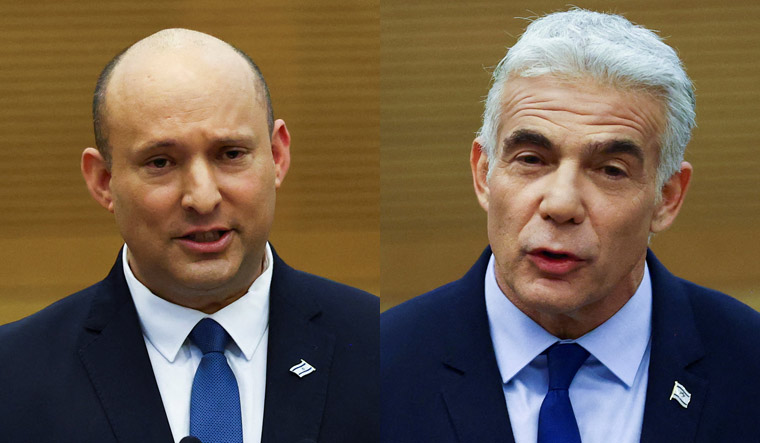Domestic upheavals in Israel are once again likely to push back the several-times-planned-and-cancelled visit of the Israeli prime minister to India. Naftali Bennett is stepping aside as prime minister after he lost the slim majority he held in the Israeli parliament, the Knesset. With the dissolving of the parliament, foreign minister Yair Lapid is taking over as the interim prime minister, and fresh polls are likely to be held around October-end.
India-Israel ties have intensified in recent years. Narendra Modi gave the impetus with his 2017 visit, the first by an Indian PM. Recently, India has also formed a semi-formal coalition with Israel, the US and the UAE, which is called by various names -- West Asia Quad, U2I2, or the International Forum for Economic Co-operation. A Free Trade Agreement (FTA) is also nearly ready and is perhaps waiting for the right platform to be announced to the world.
That platform would have been Bennett's visit, which the Israeli foreign office was hoping to organise in the June-July window, after the previously announced visit of April 3 had to be cancelled because Bennett tested positive for Covid 19 just days before. The last time an Israeli prime minister visited India was in 2018 when Benjamin Netanyahu came. He had tried a second visit, too, but that got repeatedly cancelled due to scheduling issues and domestic political turmoil in Jerusalem. After that, the pandemic began.
Bennett became the 13th prime minister of the country in January 2021. The two Pms (PM Modi and Bennet) had their first interaction in Glasgow last November, where they both attended the Conference of Parties 26 summit. "I want to thank you. You're the person who restarted the relationship between India and Israel, which is a deep relationship between two unique civilizations... It's not about interests; it's about a deep conviction that you harbour and we feel it," Bennett told Modi at that meeting.
Israel has had political instability for quite some time,fif with the forthcoming elections being the fifth in a little over three years. The winning margins have been so slender that just a few people withdrawing support crumbles the edifice. Insiders say that this was another reason scheduling a foreign visit was a problem. You just needed the PM to step out, and the support could withdraw. Learning about such developments while on a foreign tour can be terrible. It turns out that PMs don't have to leave the country, the rug can be pulled even from under their feet.





